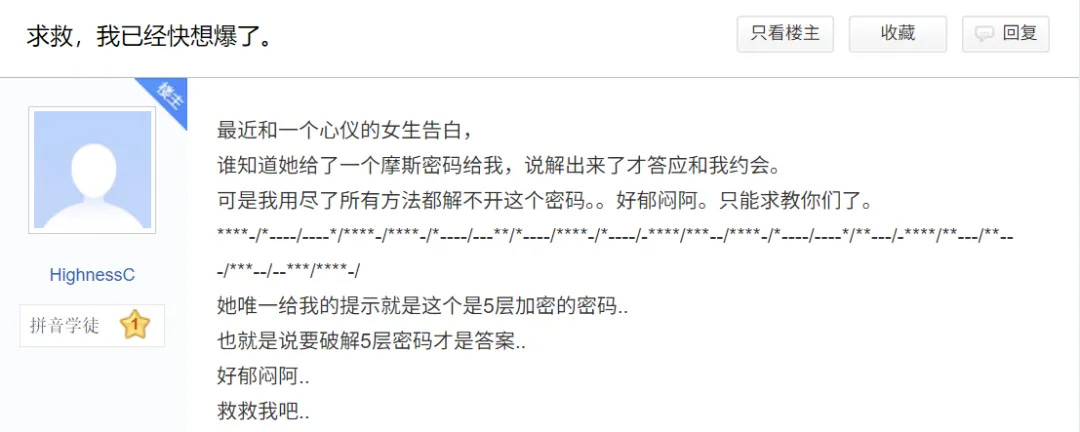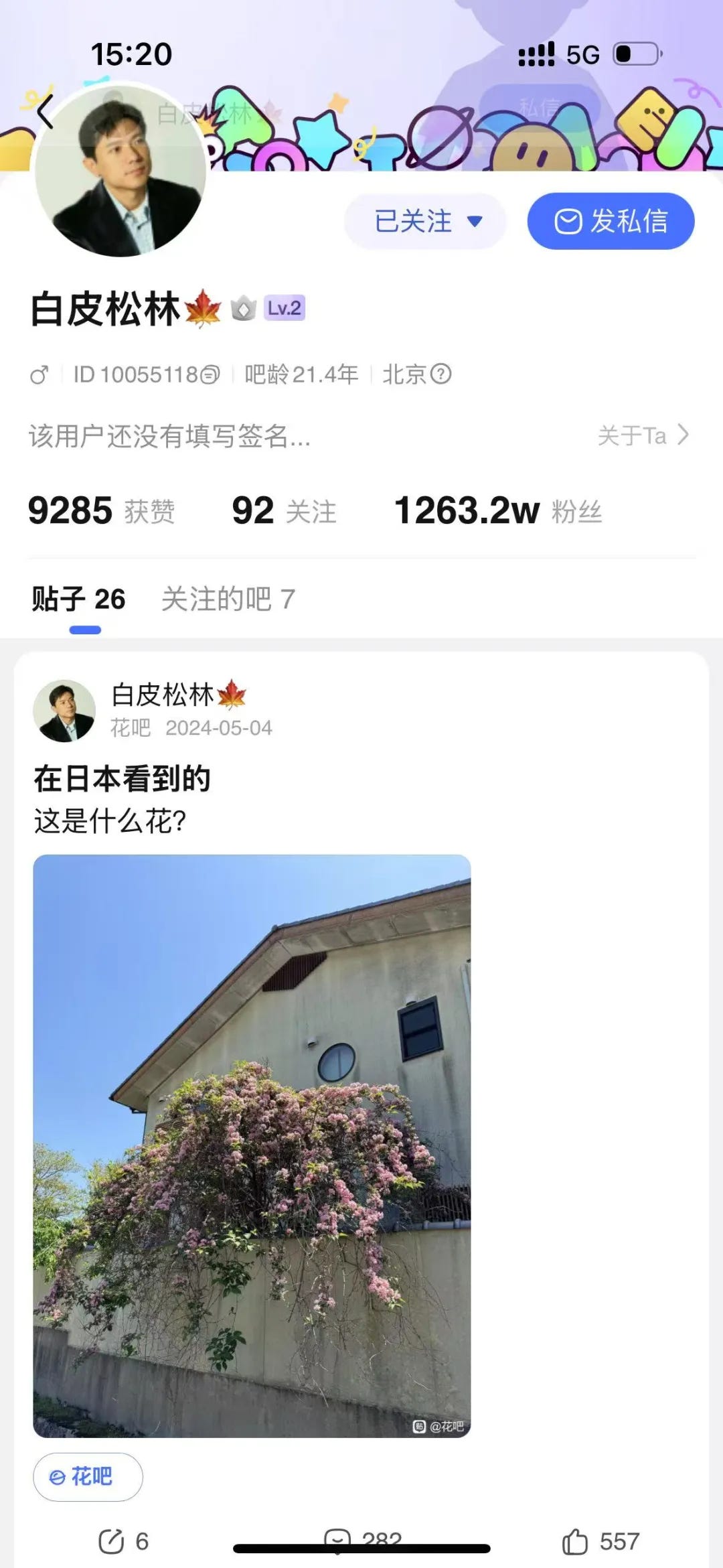The last refuge of China’s internet "old bros" (Laoge)
Inside "Tieba": The wild, witty, and unfiltered soul of Chinese cyberspace
Good evening. For those weary of the U.S.-China tariff war discourse, here's something different—a journey into a nearly forgotten yet fascinating corner of Chinese internet: Tieba (贴吧), or Baidu Tieba.
Often called "China's Reddit" (Reddit being the American forum-based social platform where communities form around shared interests), Tieba is actually a unique cultural ecosystem born from China's early internet era.
Baidu Tieba forum is about as old-school as Chinese internet communities get. "Back in late 2003, Baidu founder Robin Li had an idea: build something more engaging than a search engine. A place where people with shared interests could hang out, talk, and build community. That’s how Tieba came to life—born out of pure curiosity."
In fact, you could call Tieba China’s first real grassroots online product—Reddit, often seen as its Western counterpart, didn’t even launch until 2008. I remember scouring tieba for TV show spoilers in middle school. Imagine thousands of topic-specific forums ("bars" or "ba"), each functioning like a digital clubhouse where members post threads and exchange replies. Unlike today's algorithm-driven platforms like Xiaohongshu or Douyin, Tieba maintains a remarkably uncommercialized, freewheeling atmosphere—a digital "jianghu" (the martial arts concept of a chivalrous underworld) where strangers bond over shared obsessions.
What follows is one of my favorite stories this year so far from the WeChat blog of 真故研究室 "Real Story Research Lab," offering perhaps the most authentic window into this enduring Chinese internet subculture.
The last refuge of China’s internet "old bros" (Laoge)
While the rest of the internet was busy debating Trump’s tariffs, the number one trending topic on Tieba was something else entirely: #Welcome to Tieba’s Cyber Confession Room (#这里是贴吧赛博忏悔室#). Cue the chaos—juicy gossip, bitter rants, impromptu therapy sessions. Cheating, burnout, lying flat, emotional meltdowns—it was all on the table. Global politics might be shifting, but Tieba users seemed far more invested in their own wild lives.
Tieba still has over 20 million active forums, with hundreds of millions of users—70 percent of them men. They’re known affectionately (and sometimes sarcastically) as “old bros,” a bunch of guys who feel like your older neighbor and his friends hanging out in front of the convenience store. These are the guys who’ll roast a bad take in the “Idiot Bar” with a sarcastic “this one’s straight into the stratosphere.” They find solace for lonely souls in the “Depression Bar” with midnight heart-to-heart conversations. They’ll jump in to help when an old man gets hit by falling ice under a highway overpass. And sometimes, they act like overgrown teens—never outright rude, just dumb enough to make you laugh and shake your head. And somehow, these guys are like walking encyclopedias - throw them the most random trivia and they'll somehow have the answer.
After surviving for over two decades, Tieba still hasn't bowed out of the Chinese internet. The sheer addictive thrill of this place? Probably only those “old bros” truly get it.
#01
Tieba Old Bros: When Something’s Up, They Show Up
Will AI ever surpass humans? One netizen had a quick comeback: “Chill. AI just hasn’t met the old bros from Idiot Bar yet.”
If you haven’t been online in China for the past two decades, you’ve probably never heard of Idiot Bar (Ruozhi Bar). But if you’ve spent any time surfing the web, you’ve definitely seen its greatest hits—lines like "Technically, 'raw fish' is just... dead fish." (“生鱼片其实是死鱼片”) or "Funny how my 'latest photo' is technically my oldest one." (我最新的照片其实是我最老的照片)
Idiot Bar is just one tiny corner of Tieba’s 22 million-plus forums. So many viral memes and slang terms trace back here—from early internet legends like “rich pretty girls” (“白富美”) and “tall rich handsome guys” (“高富帅”), to the tongue-in-cheek claim that “Cao County is the center of the universe.” (It went viral as a meme after a Shandong dialect shoutout ("666 my baby!") sparked over 500 million parodies and hashtag views). A lot of those trends wouldn’t have caught fire without the old bros fanning the flames.
Their sharp logic wrapped in deadpan humor has produced some of the internet’s most iconic moments—and sometimes, it actually makes a difference in real life.
Back in 2009, someone posted in Password Bar, asking for help after confessing to a girl. Her reply? A string of Morse code.
When one user turned to Tieba’s Password Bar for help decoding a Morse code reply from his crush, the old bros didn’t hesitate. Across screens and usernames, they dove headfirst into a brainstorming marathon. By the time the thread hit the 207th comment, one sharp-thinking bro cracked it: “I LOVE YOU TOO.” And just like that, the lovers’ cryptic dance ended in a breakthrough. The thread became a Tieba classic, with users revisiting it like a digital time capsule.
That quick wit and snarky, debate-loving tone? It’s just the surface. Underneath, Tieba old bros are softies—genuinely warm, generous, and ready to help. Got a weirdly specific problem? They’ve probably got 20 solutions. A grandpa gets rescued from a fire by a security guard? The bros come together to crowdsource the perfect slogan for a thank-you banner. Got an interview with a top Esports player? They’ll help sketch out the whole Q&A like it’s their own PR campaign.
And when the stakes get high, they don’t flinch. In 2015, a user from the Asura Bar (“斗战神吧”) was the first to blow the whistle on unsanitary production lines at a pickled vegetable factory—despite the fact that both his parents worked there. His post read: “I just don’t want more people to get fooled. Let the truth spread.” The post sparked widespread outrage and played a direct role in a major consumer scandal being exposed on the nationally broadcast 3.15 program.
From quantum mechanics to router repairs, they’ve got something to say about pretty much everything.
And some of them? Absolute legends. Back in 2006, an anonymous user was desperately begging for new chapters in the Ghost Blows Out the Light Bar . When no update came, he started writing his own story—The Seven-Star Lu Palace (《七星鲁王宫》). That user was none other than the future author of The Grave Robbers’ Chronicles (《盗墓笔记》), a series that would go on to rack up millions of fans.
In 2005, Liu Cixin (a celebrated science fiction writer and Hugo Award-winning novelist, author of "The Three-Body Problem") himself, still working at a power plant in his hometown, logged into Tieba with a small side account. He left a cheeky comment under his own novel: “This is so vivid and powerful … did this guy actually serve in the military?”
Even with all their hidden talents, Tieba’s old bros never act superior. They’re the kind who’ll casually shrug off their cloaks of mystery and open up like it’s nothing. Take a recent viral thread in the Sun Xiaochuan Bar (“孙笑川吧”), where one user shared his story: a junior college guy who fell for a girl from a 211 university. He was brutally honest—felt the sting of insecurity over their educational gap, and even more so over their lifestyles. She traveled abroad often; he hadn’t even been on a plane.
Instead of mocking him, the old bros showed up with warmth: “I’ve never flown either.” “Don’t put her on a pedestal—and don’t sell yourself short.” Even as the screenshots of their increasingly sweet chats started to test everyone's emotional limits, the replies were full of blessings and support. It’s this kind of “unpolished but genuine” expression that really captures what Tieba’s old bros are all about.
In today’s internet, that kind of raw sincerity is getting harder to find. These guys bring a kind of heat—like they’re permanently 18, always full of fire. They don’t care about managing an image, don’t tiptoe around because of status. If they need to, they’ll start a fight right in the thread. But under all that banter and edge, they’ve got heart. They somehow know everything, and they’ve got this quiet empathy. They’ll listen to the kind of stuff you’d hesitate to tell even your closest friend—your regrets, your dark nights, your messy heartbreaks.
“We may have never met, but we’ve all drunk from the waters of Tieba.” (“虽未谋⾯,但共饮过贴吧水”) Tieba built this kind of unspoken brotherhood—and for a lot of people, it became a place to park their feelings when there was nowhere else to go.
#02
Rebels, Myth-Makers, Straight Shooters — That’s Just How Tieba Bros Roll
Baidu Tieba is about as old-school as Chinese internet communities get.
Back in late 2003, Baidu founder Robin Li had an idea: build something more engaging than a search engine. A place where people with shared interests could hang out, talk, and build community. That’s how Tieba came to life—born out of pure curiosity.
Back then, “online community” wasn’t even a buzzword yet. People mostly used the internet to search and read, not to talk. Tieba changed all that. It was one of the first content platforms to actually feel alive. In fact, you could call it China’s first real grassroots online product—Reddit, often seen as its Western counterpart, didn’t even launch until 2008.
Tieba kept things simple. No barriers. But its real superpower? It flipped the script on who held the mic. Unlike today’s polished, influencer-driven platforms, Tieba had no central figures, no approval queues. Anyone could create a forum. Anyone could post whatever they wanted. Moderation? Vibe control? Entirely up to the community, led by self-appointed “bar owners.”
That wide-open model turned into a creative free-for-all—and kickstarted the golden age of grassroots internet culture in China.
In 2005, the talent show Super Girl (《超级女声》) went viral. Tieba’s Super Girl Bar exploded—at one point, four posts were being made every second. The most popular singers had millions of threads dedicated to them. That year, Baidu overtook Sina in traffic and became the biggest Chinese-language website in the world. Tieba? It became the heart of the fandom universe.
Then there’s Li Yi Bar (“李毅吧”), aka Diba (“帝吧”), born in 2004. Named after a Chinese soccer player 【Editor's note: "Li Yi Bar" (李毅吧) earned its iconic nickname "Diba" (帝吧, Emperor's Bar) through an ironic internet culture phenomenon. The title originated from Chinese soccer player Li Yi's controversial self-comparison to French soccer star Thierry Henry in 2005, which netizens mockingly amplified by dubbing him "Li the Great" (李大帝). This satirical honorific transferred to his fan forum】, you’d expect a sports forum—but go in, and it’s chaos in the best way. This is where memes, parody, ironic banter, wild Photoshop edits, and rogue videos ran free. The users—who call themselves “Yi Si”—are fiercely anti-authority, anti-idol, and proud of it. What they built wasn’t just a subculture—it was an entire internet ecosystem with its own language and laws. King's Bar captured the raw, chaotic energy of the web’s early days like nothing else.
Screeshot of Diba. "When Diba rides out, nothing’s left standing"
The “Yumis” of Super Girl Bar and the “Yi Si” of Li Yi Bar once clashed in what’s now remembered as a legendary online holy war. On June 21, 2005, Diba mobilized thousands of users to “blow up” what was then the largest bar on Baidu, making a name for itself overnight.
Today, the “6.21 Incident” is just a dusty chapter in internet history—but the former Diba moderator’s now-iconic words, like something straight out of Ne Zha, still echo: “We believe there are no idols in this world. Idols are human. I’m human too.” It’s this attitude that keeps the Diba spirit alive to this day. Li Yi Bar still boasts 34 million active users.
Where there’s passion and personality, there are always memes. In 2009, the explosive popularity of Blizzard’s World of Warcraft helped WOW Bar (“WOW吧”) steal the crown as Baidu’s biggest forum. That July, a post titled “Jia Junpeng, your mom wants you to come home for dinner” (《贾君鹏你妈妈喊你回家吃饭》) took off, with over 17,000 replies in just six hours—hailed as nothing short of a “miracle of the Chinese internet.”
Scroll through the long list of internet slang born in Tieba—“Liangchen must be generously rewarded” ("良辰必有重谢") ,“go die” (“狗带”) , “completely useless” (“然并卵”), “brick-moving” (“搬砖”), “leave a name before it gets famous!” (“火钳刘明”) —and it’s hard not to grin. Each phrase is a time capsule. One look and you're back in that strange, beautiful era, flipping through a scrapbook made of memes and memories.
Back in its golden age, Tieba felt like an open playground with no velvet ropes. By 2015, its monthly active users had surpassed 300 million—1.8 times that of Weibo. No matter who you were, there was a corner in Tieba just for you.
#03
Grassroots to the Core — That’s What Makes an Old Bro
To some, Tieba looks outdated now. It missed the wave of vlogs, livestreams, and the shift toward short-form video. The Tieba bros’ unfiltered style often drew criticism from outsiders. And as the platform's heyday faded, many of its early creators moved on—becoming influencers on Xiaohongshu (Red Note), thought leaders on Zhihu, or KOLs on Weibo.
Which is why someone once asked on Zhihu: “Why hasn’t Baidu Tieba died yet?”
One upvoted answer nailed it: “Because Tieba bros have a certain charm—you’ll always find one you can trust.”
In Fanfiction Bar, you’ll still find fans creating art during the long hiatus of Demon Slayer. In Turadyn Bar (“图拉丁吧”), hardware veterans patiently walk beginners through PC builds, no charge. In Fishing Bar, rods might come up empty, but the banter never stops. The Tieba bros who’ve stuck around keep stacking posts like bricks, keeping the story of Chinese internet culture alive—raw, real, and right there for anyone who cares to read.
Even Baidu’s founder Robin Li is a Tieba old bro. He’s literally user No. 1, with over 21.4 years of Tieba “seniority” and more than 12 million followers. As recently as last May, he was still posting. He’d hop into threads to ask stuff like: “What’s this flower I saw by the road?” “Can osmanthus trees survive a northern winter?” “What does this calligraphy say?” Not the slick tech mogul you might picture—just a curious guy, asking strangers on the internet for help like the rest of us.
Anyone wanna help Robin Li out?
That’s the essence of a Tieba old bro—curious, down-to-earth, and never too cool to ask a question. These days, most online spaces are tightly curated. Usernames are no longer a mask, but a brand. Everyone’s polishing their persona, chasing followers, playing roles. But on Tieba, the old bros built something different—a messy, honest little corner of the internet where no one’s faking it.
No filters. No influencer energy. Just people saying things like: “Yeah, I’m broke—but I know GPUs.” You don’t need a ring light or a brand deal to belong. Even if you’re just another 996 office worker, in Tieba you can be a meme master, a homegrown philosopher, or that random dude who always knows the answer. People come together through shared passions, and walk away with a sense of real community.
Most of Tieba’s old-school peers—Tianya(天涯), Mop(猫扑), Xici(西祠胡同), KDNet(凯迪)—are long gone. Tieba’s still here. Somehow, it’s a miracle. Its 22-year journey is a time capsule of the Chinese internet. It remains one of the last true homes for user-generated content, still standing on its own terms—with depth, breadth, and sincerity that’s hard to find elsewhere.
And now, Tieba’s getting a second wind. Word is, in 2025, Baidu’s once again putting it back in the spotlight. They’re planning to unarchive all posts from before January 1, 2017—restoring that raw, freewheeling vibe the old bros remember. They’re even exploring ways to bring in AI to help new users tap into that old-school jianghu spirit.
A real community needs room for freedom and weirdness. That’s how it draws in the brilliant minds. And if you can hold on to those people, the quality follows. As long as Tieba keeps its old bros, it won’t fade into the background.
The good news? The jianghu still breathes. The old bro spirit is alive and well. On July 24, 2024, a user posted in the Sun Xiaochuan Bar (“孙笑川吧”): “Today’s my 30th birthday.” He said he couldn’t sleep—laying in bed, thinking about his life so far. Wondering what everyone else was up to. That single post resonated with thousands. Over 30,000 replies stacked nearly 400 pages. And even now, people are still chiming in with a simple message: “Wishing you happiness, old bro.”
And maybe that’s why Tieba still hasn’t disappeared. At its core, it’s still real. Still warm. That rare, genuine feeling—that sense of people just being people—hasn’t changed in over two decades. And honestly? You’d be hard-pressed to find that anywhere else.
That raw, grassroots DNA might just be the rarest thing left on today’s internet—and it’s what keeps Tieba quietly, stubbornly alive.






